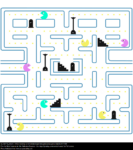-

Who Should You See? Dietitian vs. Certified Practicing Nutritionist – The Right Choice for Your Health
•
When looking for professional nutrition support, you may wonder whether to see a Dietitian or a Certified Practicing Nutritionist (CPN). While both are registered allied health professionals, their focus, approach, and areas of expertise differ. Dietitians and Certified Practicing Nutritionists (CPNs) are university degree qualified, registered allied health professionals. This is different from the…
-

Making Time for Healthy Changes: A Practical Guide
•
Changing our food and exercise habits often sounds easy—until we try to put them into practice. The challenge isn’t lack of motivation; it’s that our time is already fully allocated to existing habits. Time is a limited resource, and any new activity must replace something else. Our brain often resists change, making us believe…
-

The Hidden Force Behind Your Food Cravings: It’s Not About Willpower
•
If you’ve ever battled with food cravings and told yourself it’s just a lack of willpower, it’s time to rewrite that story. Cravings aren’t about weakness or self-control—they’re the result of complex signals from your body, including messages from the tiny but powerful microbes living in your gut. Understanding this connection can replace shame…
-
Gut Health is Important for Mental Health
•
At Thrive Wellness, we recognise that mental health is multifaceted, and addressing it from all angles is important. While psychological therapy plays a significant role in mental health care, did you know that your gut health could be just as important? The gut-brain connection influences everything from mood to cognitive function and improving the…

